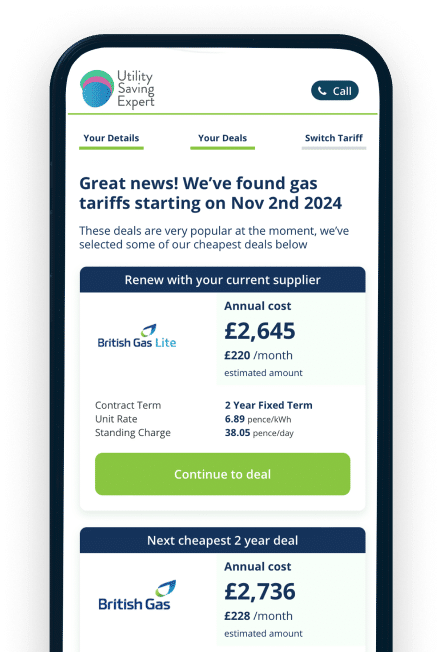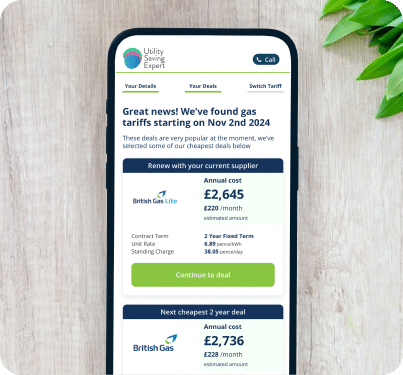
Business Energy Comparison
Compare Business Energy Prices, Suppliers & kWh Rates
We work with a panel of trusted business energy suppliers, so you can switch with confidence.
Compare Today's Rates
How To Compare Business Energy Rates & Switch Suppliers
Follow these four simple steps to switch business energy suppliers with Utility Saving Expert today:
Enter your business postcode details on our form. If you need help, call our energy experts on 01242 32 31 31
We’ll provide you with a list of business energy quotes and tariffs that fit your needs.
Compare the different business energy contracts and choose the one you like. Your new supplier will handle the switch on your behalf.
Your switch will be complete within 4 to 6 weeks; sit back and enjoy the savings on your next energy bill.
What Makes Our Business Energy Price Comparison Tool Stand Out?
Our comparison platform does more than just list potential suppliers – it gives a detailed breakdown of each offer.
Tariff type
Duration of the Contract
Extra perks or features
This comprehensive information allows you to choose an energy option that aligns with your company’s energy usage, budget, and sustainability goals.
We understand how volatile the energy market can be and that prices can change due to many external factors. That’s why our 100% free online comparison tool provides real-time commercial energy tariffs, ensuring access to the most recent energy prices on the market.

Compare Business Energy Prices, Suppliers & kWh Rates

Why Switch Business Energy Suppliers?
Switching your energy supplier might seem overwhelming – but sticking with your current energy supplier might not always be the most sensible financial choice.
Partnering with a reliable commercial energy supplier is crucial. Not only do you benefit from cheaper energy deals, but you’ll also enjoy stability despite the market’s ups and downs.
Reduce costs and boost profits
Perfect fit
Go green
Business Electricity And Gas Rates For Larger Businesses
Are you looking for personalised commercial energy rates for your large business? We can help!
Larger businesses, with 250+ employees, often require specialised meters – known as half-hourly or maximum-demand meters – and face different energy pricing structures compared to SMEs. We help our commercial customers find the best energy prices, tailored to their higher consumption levels.
Whether you operate from a single location or have multiple sites, our comparison tool can help you find better deals today.
Business Electricity And Gas Rates For SME Businesses
If you run an SME in the UK and are looking for cheaper energy rates, then you’re in luck with Utility Saving Expert.
SMEs are divided into three sections, and their energy contracts often have more flexibility than those of larger businesses:
- – Micro businesses: 1-9 employees
- – Small businesses: 10-49 employees
- – Medium businesses: 50-249 employees
Our easy-to-use comparison tool makes comparing multiple energy quotes a breeze. Find cheaper deals with us today!
How To Choose The Best Business Energy Supplier
Choosing the best commercial energy supplier goes beyond picking the cheapest deal.
Securing a competitive price is crucial, but other factors, like contract lengths and flexibility, need consideration, as well as ensuring your supplier adapts to the changing energy landscape.
Here’s what to look for:
Prioritise reliability and stability
- Choosing a company with consistent service and financial stability is important, especially with fluctuating market prices.
- Opt for energy suppliers with a proven track record of success to avoid unexpected business gas and electricity price hikes and unreliable service.
- When comparing business energy prices, a company’s reputation is important. Use online review platforms like Google Reviews, Trustpilot, Yelp, Facebook, and X to gauge the public’s perception.
Independent and green energy suppliers
Beyond the big names lies a world of emerging energy brands that offer exciting business energy deals, competitive rates, and terrific customer service.
If sustainability is your goal, many of the energy suppliers we partner with offer green energy tariffs, championing renewable energy and even offering green business gas rates.
Tailored solutions for your business
Your business energy needs are as unique as your business operations.
Identify your non-negotiable deal breakers, such as:
- Does your business require exceptional customer support due to your complex energy needs?
- Is flexibility in adding or removing features crucial to your business model, growth, and end goals?
Once you’ve decided on your non-negotiables, you can shortlist a few potential suppliers.
Shortlist and negotiate
- Use our online comparison tool to conduct an informed price analysis.
- Ask the relevant energy suppliers to send a hardcopy quotation for you to use in the assessment process. Leverage these quotes to negotiate directly with business energy providers, explicitly explaining your deal-breakers and specific requirements.
This is how you whittle down your shortlist to one business energy supplier.
Customer service and support
Opt for commercial energy providers with a proven track record of exceptional customer service and assistance. This ensures your peace of mind knowing you’re supported every step of the way.
Timing your switch
Plan your switching window strategically, ideally during the last year of your current contract. This ensures you can transition smoothly without incurring out-of-contract rates, which can cost more in the long run.
Note: Business energy contracts do not have a 14-day cooling-off period like residential contracts do.

Compare Business Energy Prices, Suppliers & kWh Rates
Our Trusted Business Energy Suppliers
We’ve collaborated with several mainstream and emerging UK business energy suppliers to ensure you find the perfect match.
Mainstream energy suppliers
These established players offer competitive rates and have well-developed customer service infrastructure in place:
- – British Gas
- – Crown Gas & Power
- – EDF Energy
- – Scottish Power
- – SSE
- – Valda Energy
Emerging energy suppliers
Smaller, innovative companies provide unique plans and competitive tariffs, with a strong focus on customer satisfaction:
- – BG Lite
- – Opus Energy
- – TotalEnergies
- – British Gas Plus
- – Smartest Energy
See our full list of reputable business energy suppliers.
Additional energy suppliers
These business energy suppliers often champion renewable energy sources, offering green business tariffs aimed to align with the UK’s 2050 Net Zero goal:
- – Corona Energy
- – Haven Power
- – Npower
- – Eon
- – Advanti Gas
- – Squeaky
What Are The Latest Business Energy Rates?
When looking for the latest business energy rates, it’s important to compare what businesses similar in size to yours are paying for their commercial energy.
Latest business electricity rates
Here’s a list of the latest business electricity prices for various-sized businesses:
| Size | Annual energy usage (kWH) | Unit price per kWh | Daily standing charge | Annual cost | |
|---|---|---|---|---|---|
| Microbusiness | Up to 5,000 | 26.6p | 54.4p | £863.11 | |
| Small business | 5,000 – 15,000 | 26.6p | 66.7p | £2,899.18 | |
| Medium business | 15,000 – 25,000 | 26.3p | 73.7p | £5,525.87 | |
| Large business | 25,000 – 50,000 | 26.2p | 122.2p | £10,525.87 |
These figures reflect a two-year fixed tariff based on respective business sizes. Prices reflect a live market and may vary over time.
Updated March 2025.
Latest business gas rates
Here’s a list of the latest business gas prices for various-sized businesses:
| Size | Annual energy usage (kWH) | Unit price per kWh | Daily standing charge | Annual cost | |
|---|---|---|---|---|---|
| Microbusiness | Up to 5,000 | 9p | 37.1p | £359.29 | |
| Small business | 5,000 – 15,000 | 7.8p | 46.5p | £948.21 | |
| Medium business | 15,000 – 25,000 | 7.7p | 46.7p | £1,706.81 | |
| Large business | 25,000 – 50,000 | 7.7p | 56.5p | £3,103.26 |
Data correct as of March 2025. These prices reflect a live market and are subject to fluctuation. Annual cost based on a 2-year contract and the median kWh usage within each business size banding.
Latest business energy tariffs per region
Here’s a list of the latest business energy tariffs across the UK:
| Region | Gas Unit Price (per kWh) | Gas Standing Charge (per day) | Electricity Unit Rate (per kWh) | Electricity Standing Charge (per day) |
|---|---|---|---|---|
| Eastern | 6.48p | 33.10p | 25.87p | 51.73p |
| London | 6.62p | 34.29p | 26.34p | 43.12p |
| Midlands | 6.53p | 33.46p | 24.19p | 65.47p |
| Northern | 6.55p | 33.59p | 23.52p | 72.29p |
| Northern Scotland | 6.49p | 33.62p | 25.23p | 63.86p |
| North West | 6.48p | 33.61p | 25.30p | 53.58p |
| Southern | 6.63p | 33.05p | 24.89p | 66.15p |
| Yorkshire | 6.52p | 33.58p | 23.72p | 70.36p |
All unit prices per kWh are accurate as of March 2025. These rates reflect a fluctuating energy market and may change frequently.
Who Is The Cheapest Business Energy Supplier In 2025?
Here are the cheapest commercial energy suppliers in the UK:
Business electricity tariffs (per kWh)
| Supplier | Unit price per kWh | Daily standing charge | Annual Cost | |
|---|---|---|---|---|
| British Gas | 26.6p | 62p | £6,750.09 | |
| British Gas Lite | 26.4p | 42p | £6,750.09 | |
| Valda | 24.4p | 123.4p | £6,585.86 | |
| Scottish Power | 23.7p | 125p | £6,374.93 | |
| Smartest Energy | 25.2p | 62.3p | £6,518.14 |
Based upon a business using 25,000 kWh of electricity annually on a two-year fixed-rate deal.
Data updated January 2025
Business gas tariffs (per kWh)
| Supplier | Unit price per kWh | Daily standing charge | Annual Cost | |
|---|---|---|---|---|
| British Gas Lite | 7.4p | 45.9p | £2,007 | |
| Scottish Power | 7.6p | 35.1p | £2,037 | |
| British Gas | 8.0p | 47.9p | £2,179 | |
| Smartest Energy | 6.7p | 144.3p | £2,213 | |
| Valda Energy | 7.7p | 41.1p | £2,079 |
Data correct as of March 2025. These prices reflect a live market and are subject to fluctuation. Annual cost based on a 2-year contract and the median kWh usage within each business size banding.
What Is The Average UK Business Energy Bill?
We can estimate the average business energy bill per annum for gas and electricity to be:
| Size | Annual energy usage (kWH) | Electricity cost per year | Gas cost per year | Average energy bill | |
|---|---|---|---|---|---|
| Microbusiness | Up to 5,000 | £1,312 | £550 | £1,862 | |
| Small business | 5,000 – 15,000 | £2,431 | £972 | £3,403 | |
| Medium business | 15,000 – 25,000 | £4,120 | £1,631 | £5,751 | |
| Large business | 25,000-50,000+ | £6,870 | £2,980 | £9,850 |
Prices reflect a two-year fixed tariff based on respective business sizes. Prices reflect a live market and may vary over time. Updated March 2025.

What To Consider When Comparing Business Energy Suppliers
There are several things to consider when comparing business energy contracts to save money on your annual bills, such as:
Location and industry
Meter type
Annual energy consumption
Incentives
Supplier reputation
How business energy contracts work

Compare Commercial Energy Prices, Suppliers & kWh Rates
What Types Of Business Energy Tariffs Are Available?
There are several different types of tariffs available for your chosen business energy provider:
Variable rates
This is a flexible tariff and your unit price will change each month, based on wholesale prices. This offers great flexibility, especially when wholesale prices decrease, but can make planning and budgeting for your business energy bills challenging.
Useful insight: British Gas’s electricity fuel mix is made up of 43% of renewable energy.
Fixed rates
Offer “fixed” prices for the entire duration of your energy contract, hence the name. It is by far the most popular option as price stability is a guarantee even when wholesale prices are on the rise. Fixed-rate business energy contracts are usually longer (up to five years) compared to domestic fixed-rate contracts (one to three years).
Deemed rates
These rates apply if you have no contract in place, often occurring when businesses move into new premises. These business energy prices are usually the most expensive and should be avoided.
Out-of-contract rates
This occurs when you have not agreed to new business energy tariffs before your current contract comes to an end. Again, this type of business energy contract should be avoided as they often have astronomical rates.
Blend and extend tariffs
If energy prices drop, businesses can “blend” the rate from their current contract with a new, lower rate and then extend the contract duration.
Pass-through tariffs
While the energy unit rate might be fixed, other charges like network fees or green levies are passed directly onto the business. This can result in variable monthly bills but offers transparency as businesses can see exactly what they’re paying for.
Green energy tariffs
These tariffs are when your energy supplier matches the energy you buy with renewable energy sources, lowering your carbon emissions!
Rollover tariffs
Rollover tariffs occur when your energy supplier automatically “rolls your contract over” to the next term when you don’t cancel it (or negotiate a new deal) in time. Essentially, these tariffs are a penalty for inaction and are significantly more expensive than the original contract rates.
What Are The Benefits Of Using Utility Saving Expert?
Here are the benefits of using Utility Saving Expert for your business energy needs:
Fast and easy switching
We compare prices and switch your supplier in minutes, making the process hassle-free.
Transparent service
Our business energy comparison service is completely free, with no hidden charges. We pride ourselves on being upfront and honest.
Unbiased advice
We offer impartial analysis of the commercial energy market, ensuring you get the best rates based on your needs.
Up-to-date results
Our system uses the latest pricing to find you the most competitive deals available.
Excellent customer support
We offer exceptional customer service and are there to help you throughout the entire switching process.
Socially responsible
We donate 10% of our profits to charities fighting fuel poverty, making a positive impact beyond your business.

Compare Business Energy Deals, Rates, Suppliers & kWh Prices
Frequently Asked Questions (FAQs)
Will my business supply be disrupted when switching energy providers?
No, your new energy provider will switch your business energy contract without any hassle or disruption to your supply.
What is the Climate Change Levy (CCL)?
The Climate Change Levy (CCL) is a government tax on energy delivered to non-domestic users in the United Kingdom. It’s aimed at promoting energy efficiency and reducing greenhouse gas emissions in business operations.
Currently, businesses are charged (per kWh) £0.00775 for both electricity and gas for the period April 2024 – April 2025.
Can I consolidate energy billing if I own multiple properties?
Yes, you can. Consolidating your business’s energy consumption under a single invoice can be achieved by using a multi-site meter. This streamlines the administration of managing gas and electricity bills across multiple properties. You’ll potentially cut costs when merging various business locations under one energy contract (using a multi-site meter).
Is domestic energy different from commercial energy?
Yes, domestic and business energy differ in many ways. Businesses usually use more energy at different time frames when compared to domestic energy usage. Suppliers set different rates to reflect these volumes and usage patterns.
Is the business energy feed-in tariff still available?
No, the Feed-in Tariffs (FIT) scheme was a government initiative that rewarded local businesses and residents for generating green energy. The scheme ran until April 2019 and no longer accepts applications.

Compare Business Prices, Suppliers & kWh Rates With Utility Saving Expert
Utility Saving Expert can help you get cheaper business energy rates by comparing quotes from multiple UK providers. Use our 100% free, online comparison tool to compare quotes based on your specific needs and what you want from your business electricity.







